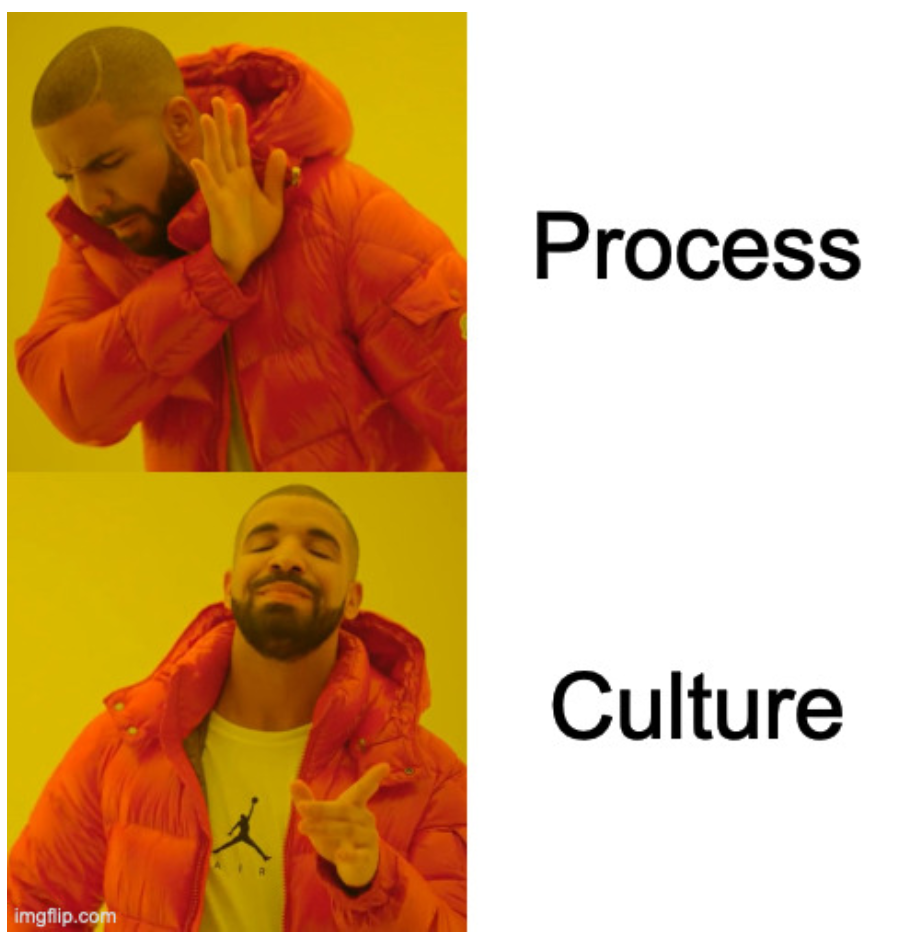A process is a meme

A process is a meme. In fact, any process that isn’t as intuitively understandable, easily adoptable, and seamlessly scalable is at the very least, inefficient, and more generally, harmful, for an enterprise.
And sadly, most processes are terrible!
So, it begs the question - why do you need a process in the first place?
You need a process so best behaviors can be imitated at scale and optimal outcomes can be achieved predictably with minimal intervention. It’s so you don’t have to reinvent things each time and teams can function autonomously. Picture an assembly line if you will.
Best behaviors. Optimal Outcomes. Sounds reasonable enough.
What if you can’t agree on either?
The challenge is if something is sufficiently complex, there will be multiple perspectives on both behaviors and outcomes. If it’s really complex, these will be point in time dependent.
Let me take an example,
Finance wants compliance. Marketing wants pipeline. Finance wants marketing to comply, Marketing wants Finance to get out of the way. Behaviors and outcomes of both teams seem antithetical to each other. What should you do?
You could reach a negotiated compromise and institute a process that satisfies some parties some times. In which case, you compromise on either outcomes, compliance or pipeline, sometimes. What if those times have massive downsides?
At a startup running at breakneck speed, this isn’t a hypothetical - it’s a reality.
If a process doesn’t objectively improve outcomes for all parties involved, then you’re better off brute forcing a problem through first principles. At least that way things get done and you don’t piss people off. It's important to recognize, a process is not an end in itself.
In the above case, your Finance and Marketing folks could just hash things out instead of repeating that annoying phrase, “but, that’s the process”.
So, how often can one do this? And how can one have any predictability at all if everything is down to a case by case basis?
Not everything has to be a negotiation of this kind. How about you start at 50% and then progressively reduce it as things become more predictable?
Side note: predictability of outcomes is eminently desirable, but if those outcomes aren’t optimal, then you’re just being reliably poor.
But, how do you trust people to make the right decisions each time?
Now, that’s a question worth pondering about. Because, you need more than just a process to enable that - you need Principles. You need a shared culture of decision making to enable the best possible outcomes each time.
What if your Finance and Marketing folks agreed on a few broad principles:
speed > convenience / nothing or no one will wait > 1 day even if that means additional work / that works both ways
external > internal / prioritize external stakeholders over internal ones / that could mean vendors or even auditors
win-win always / strive harder to invest in each other’s success / build empathy / strictly avoid zero sum games
Once you align on a shared culture, building a more effective process becomes simpler. It’s like learning and understanding the rules of grammar before using the vocabulary.
You’re not just speaking the same language now, you even mean the same things.
This builds an intuitive understanding of what’s right. It’s also easily adoptable because you don’t have to refer to row 23 of a document. And is scalable across people & situations.
Your process has become a meme.
Too often, when we jump to processes without investing in a shared culture of decision making we infantilize people, deny them agency, and set people up to frustration & failure.
Anyway, in summary…

















